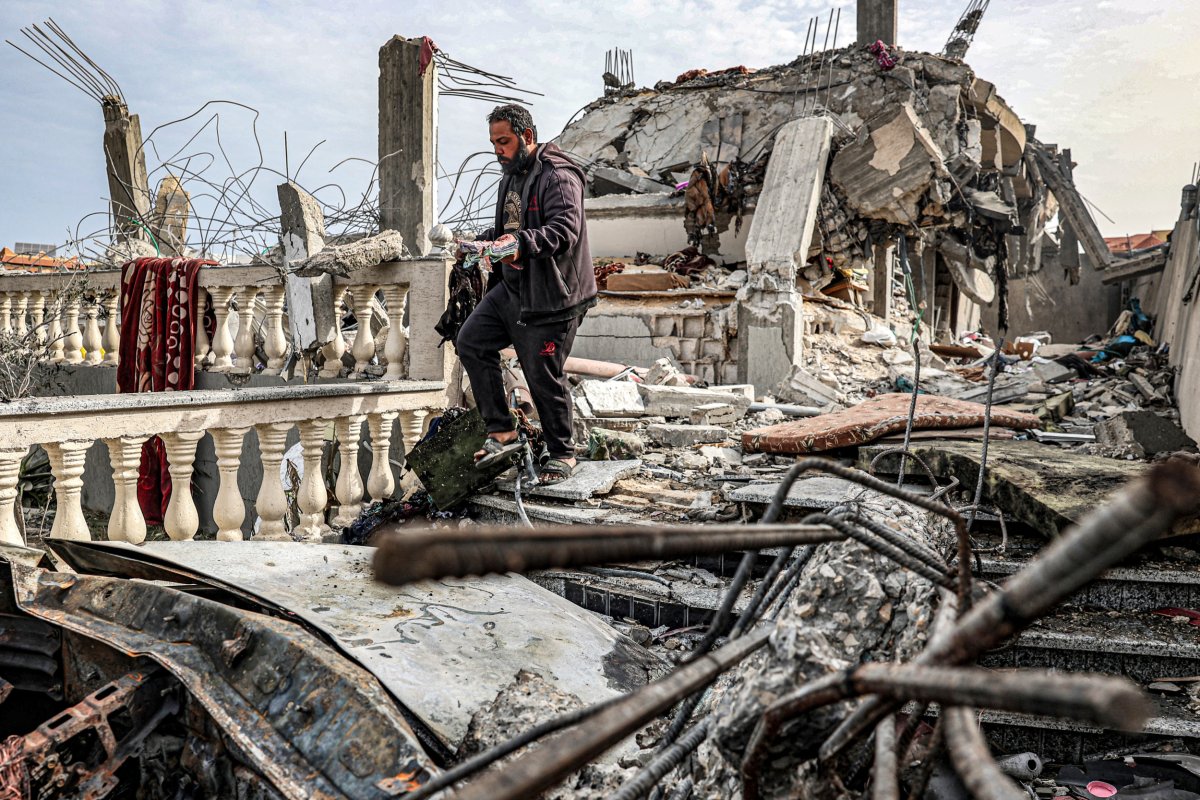The State Department on Wednesday again warned Israel about an offensive against the southern Gaza Strip city of Rafah, saying that an assault on the territory's frontier refuge would inflict "massive harm" on civilians and ultimately weaken Israeli security.
For months, U.S. officials have been warning against an Israeli attack on Rafah, which sits along Gaza's border with Egypt and has become the "last refuge" for more than 1 million Palestinians fleeing Israel's offensive against the devastated territory.
Washington wants Israel to conduct a more limited, targeted operation to root out the Hamas and other militant leaders and formations believed to be in Rafah, including their occupation of a network of tunnels underneath it. But Israeli Prime Minister Benjamin Netanyahu and his war cabinet have repeatedly made clear they see a full assault as their only choice.
"We think that the plan that Israel has said it intends to pursue with respect to Rafah is one that would be a mistake," State Department spokesperson Matthew Miller told journalists at a Wednesday briefing. The proposed operation "would have enormous—a terrible impact on the civilian population there and would weaken Israel's security, and we think there's a better way," he said.

Rafah's prewar population of around 250,000 has been swollen by waves of refugees fleeing Israeli attacks in the north and center of the Gaza Strip. Some 1.4 million people are now believed to be in Rafah, overwhelming already scant infrastructure there and raising fears of epidemics and starvation.
Miller said: "What we have said is the kind of mission that we could support is a much more targeted, limited campaign that could still achieve the same objectives, that could still lead to the defeat of those remaining Hamas battalions inside Rafah, but without massive harm to the civilian population, without hindering the delivery of humanitarian assistance, and without actually weakening Israel's security instead of strengthening it."
One American volunteer physician told Newsweek in February that an Israeli assault on Rafah would prove "catastrophic."
But the Israeli view has been uncompromising. Amir Avivi, the founder and chairman of the Israel Defense and Security Forum and a former Israel Defense Forces senior commander, told Newsweek last month: "When we go into Rafah, this is going to be in the south the decisive battle that will destroy Hamas as a governmental and military entity.... I don't see any scenario where Israel is not going into Rafah."
Fraying U.S.-Israel Relations
Netanyahu has been trying to maintain foreign—and especially U.S.—support amid growing concern over the massive civilian casualties in Gaza and the Israeli security crackdown in the occupied Palestinian West Bank, where hundreds have been killed since Hamas' October 7 attack on Israel.
"Victory is within reach," he told American lawmakers this week. "It's a few weeks away." Israel, he added, has "no choice" but to move into Rafah, given that his country's "very existence is on the line."
But the veteran leader's political capital in the West has been badly depleted by the latest war on Gaza, now almost six months old. More than 32,000 Palestinians have been killed and nearly 75,000 wounded in the conflict, according to Gaza Health Ministry data cited by the Associated Press.
About 1.4 million of Gaza's 2.3 million prewar population have been displaced, the AP said. The Wall Street Journal reported in December that more than 70 percent of all homes in Gaza had been damaged or destroyed.
In the West Bank, meanwhile, at least 435 Palestinians have been killed by Israeli security forces and settlers, according to Associated Press figures. Another 7,770 have been arrested, according to the Commission of Detainees Affairs and the Palestinian Prisoners Society, which are both Palestinian organizations.
Israel launched its offensive after Hamas' October attack on southern Israel, which killed some 1,200 people and saw 257 people taken back into the Strip as hostages. Israel believes 134 remain unaccounted for. At least 251 Israel Defense Forces members have been killed in the Gaza incursion to date.

American pressure has been building on Israel to reduce civilian casualties and allow more humanitarian aid to reach Gaza amid fears of an imminent famine. This week, the U.S. abstained on a United Nations Security Council vote demanding an immediate ceasefire, allowing the motion to pass. The U.S. had previously blocked all votes that did not explicitly link a ceasefire to Hamas' release of all remaining hostages.
Netanyahu responded by canceling a planned delegation visit to the U.S. "The United States has abandoned its policy in the U.N. today," Netanyahu said after the vote, describing the move as a "clear retreat from the consistent position of the U.S. in the Security Council since the beginning of this war."
The abstention, he said, offered Hamas "hope that international pressure will force Israel to accept a ceasefire without the release of our hostages."
Future Flash Points
U.S.-Israel relations appear to be in a moment of flux, although President Joe Biden and other top U.S. officials have maintained their full-throated support of Israel's right to retaliate against Hamas and other militants and refuse to end vital American military exports to the country.
The relationship is stirring up trouble for Biden on the home front, where Democrats—particularly younger voters and voters of color—are expressing their anger. The political implications were underscored in Michigan's Democratic primary in February, in which 16.2 percent voted "uncommitted" in protest of the White House's support for Israel's Gaza offensive.
On Wednesday, the State Department's Miller cited two other fronts that risk a further undermining of U.S.-Israeli relations.
In the West Bank, he said, there is "a fundamental disagreement with the Israeli government" over the maintenance and expansion of settlements considered illegal under international law. Last week, Israel's far-right finance minister, Bezalel Smotrich, announced the country would seize another 1,976 acres of West Bank land.
"We will continue to be clear about what we think about these actions," Miller said. "And ultimately it's why we will continue to pursue an effort to establish an independent Palestinian state and resolve these longstanding questions so you don't have this decades of encroachment in the West Bank that are bedeviling the Israeli government, bedeviling the Palestinian people and ultimately making peace more difficult."

On the Israel-Lebanon border, meanwhile, tit-for-tat skirmishes between Israeli forces and the Hezbollah militia—a powerful Islamist group, aligned with Iran, that controls southern Lebanon—have been constant since October 7. Israel is conducting regular strikes on the group's leadership deep into Lebanese territory, including the capital, Beirut.
Israeli leaders want Hezbollah to abide by the 2006 U.N. Security Council Resolution 1701, which prohibits any Hezbollah presence south of the Litani River, 18 miles north of the Israeli border. Israel has threatened war to achieve the goal.
"We do still want to see a diplomatic solution," Miller said about the border tensions. "It's something that we have pursued. We believe that preventing escalation is of utmost importance, and we will continue to work towards a diplomatic resolution that would allow Israeli and Lebanese citizens to return to their homes and live in peace and security."
Uncommon Knowledge
Newsweek is committed to challenging conventional wisdom and finding connections in the search for common ground.
Newsweek is committed to challenging conventional wisdom and finding connections in the search for common ground.
fairness meter
To Rate This Article
About the writer
David Brennan is Newsweek's Diplomatic Correspondent covering world politics and conflicts from London with a focus on NATO, the European ... Read more
To read how Newsweek uses AI as a newsroom tool, Click here.








